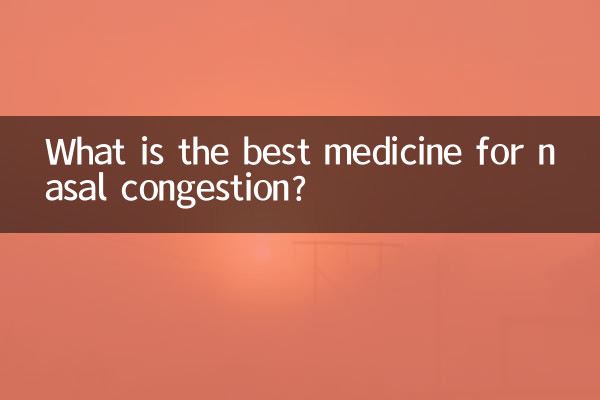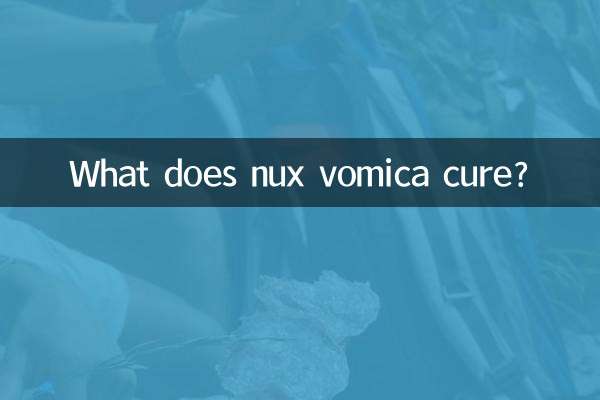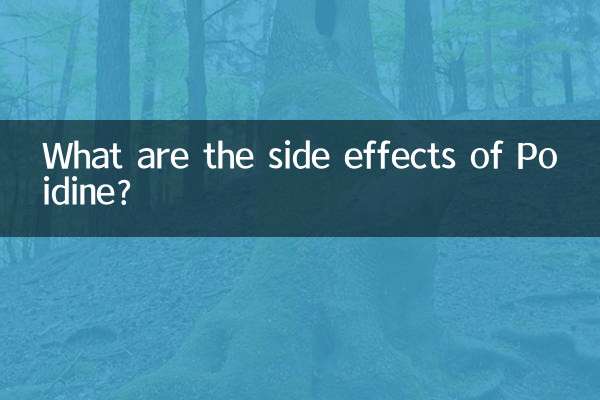What is the best medicine for nasal congestion? Analysis of hot topics on the Internet and medication guide
Nasal congestion is a common respiratory symptom that may be caused by colds, allergies, rhinitis, etc. In the past 10 days, there has been a lot of discussion on the topic of medication for nasal congestion on the Internet. The following combines hot topics and medical advice to provide you with structured analysis and medication recommendations.
1. Statistics of popular nasal congestion topics across the Internet (last 10 days)

| hot topics | Number of discussions (10,000) | main focus |
|---|---|---|
| How to quickly relieve nasal congestion | 12.5 | Drug and non-drug therapies |
| Allergic rhinitis nasal congestion medication | 8.3 | Antihistamines and hormone sprays |
| Safe medication for nasal congestion in children | 6.7 | Dosage and side effects |
| Do you need antibiotics for nasal congestion? | 5.2 | Bacterial vs viral infections |
2. Classification and recommendation of commonly used drugs for nasal congestion
| drug type | Representative medicine | Applicable scenarios | Things to note |
|---|---|---|---|
| Decongestants (nasal spray/oral) | Oxymetazoline spray, pseudoephedrine | Short-term relief of nasal congestion (≤3 days) | Long-term use may cause rebound nasal congestion |
| antihistamines | Loratadine, Cetirizine | allergic rhinitis nasal congestion | May cause drowsiness |
| Nasal hormone spray | Budesonide, fluticasone furoate | Chronic rhinitis/long-term nasal congestion | Requires continuous use for several days to take effect |
| Chinese patent medicine | Tongqiao Rhinitis Tablets, Biyuanshu Oral Liquid | Adjuvant treatment for colds or rhinitis | Requires identification and use |
3. Medication recommendations for nasal congestion due to different causes
1. Nasal congestion caused by cold:Decongestants (such as pseudoephedrine) are preferred to relieve symptoms, and can be combined with antiviral Chinese patent medicines. Avoid overuse of antibiotics.
2. Allergic nasal congestion:Use antihistamines (such as loratadine) and nasal steroid sprays (such as budesonide) in combination. In severe cases, you can consult your doctor to add a leukotriene receptor antagonist.
3. Chronic rhinitis and nasal congestion:Long-term management requires nasal corticosteroids, and decongestants can be used short-term in acute attacks.
4. Medication precautions
1.Medication for children:Children under 2 years of age should use decongestants with caution, and children under 6 years of age should follow medical advice. For allergic nasal congestion, children's antihistamines can be used.
2.Pregnant/lactating women:Normal saline irrigation is preferred, and if necessary, consult a doctor to use low-dose nasal steroids.
3.Avoid dependencies:Nasal spray decongestants should be used for no more than 3 consecutive days to prevent mucosal damage.
5. Non-drug relief methods
1.Steam inhalation:Warm steam can temporarily relieve nasal congestion, and menthol is even more effective.
2.Normal saline rinse:Nasal irrigation can remove secretions and is suitable for all types of nasal congestion.
3.Acupressure:Massaging the Yingxiang points (on both sides of the nose) helps with ventilation.
Summary: Medication for nasal congestion needs to be selected based on the cause. Decongestants can be used for short-term symptoms, and long-term management needs to be combined with treatment of the cause. If nasal congestion lasts for more than 10 days or is accompanied by purulent discharge or fever, you should seek medical treatment in time.

check the details

check the details